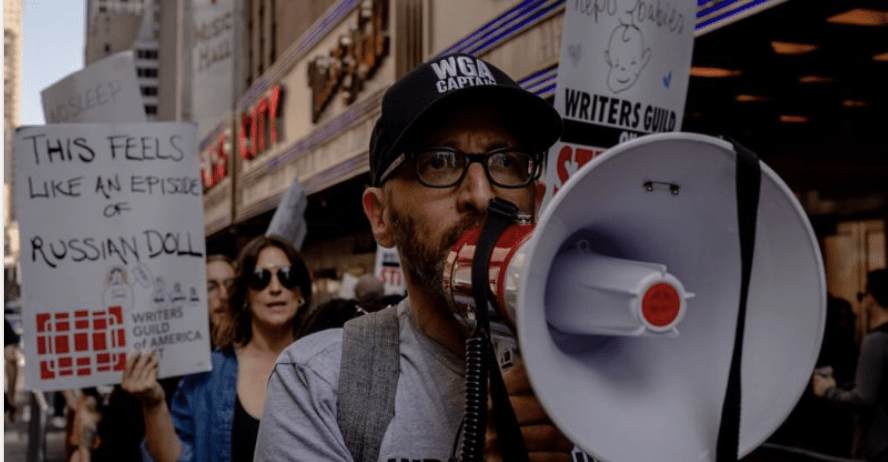May 15, 2023 | By John Koblin
As scores of marketers made their way to Radio City Music Hall on Monday morning for a major event hosted by NBCUniversal, they were greeted by dozens of striking writers marching near the entrances to the building.
“NBC, you’re no good, pay your writers like you should!” they chanted.
As the writers’ strike enters its third week, demonstrators have set their sights on disturbing the so-called upfront week, a decades-old tradition where media companies stage lavish events to promote their lineups in an attempt to woo advertisers.
“This is why ‘Saturday Night Live’ wasn’t on, huh?” one marketer remarked to another outside Radio City.
Even before Monday, when the upfronts officially started, the striking writers had already successfully shaken up the event. Netflix, which introduced commercials last year, was poised to have its first-ever upfront on Wednesday at the storied Paris Theater. But as executives grew concerned about the demonstrations, the streaming company abruptly canceled the in-person event late last week, and elected to make it virtual instead.
Other major media companies — including Fox, Disney and Warner Bros. Discovery — have decided to forge ahead. Still, media executives have been anxiously awaiting the fallout from the prospect of hundreds of writers assembling on picket lines.
Text messages flew back and forth all weekend: Would more companies cancel their in-person upfront presentations? Would the sight and sounds of marching writers be too much for some marketers to bear, leaving hundreds of empty seats at venues like the Javits Center and the Theater at Madison Square Garden? And how much would a chaotic scene affect their bottom lines?
Negotiations between the major Hollywood studios and the Writers Guild of America, the union that represents the writers, broke down on May 1, and 11,500 writers for television and film immediately went on strike. The writers contend that their wages have stagnated and working conditions have deteriorated in the streaming era.
But the writers are not just demonstrating outside the major studios. They have also managed to delay or shut down some productions where scripts are in the can and filming continues. They have gone far afield as well, setting up pickets outside productions in Maplewood, N.J., Chicago and Philadelphia. Ted Sarandos, the co-chief executive of Netflix, canceled an appearance at the PEN America Literary Gala because of the threat of demonstrators. And there are grave concerns in the theater world that the Tony Awards will be postponed if the writers proceed with a plan to picket the award show.
Even without the strike, the mood surrounding this year’s upfronts was gloomy. Advertising dollars remain a vital source of revenue for media companies, and billions of dollars are usually traded in the weeks and months after the upfronts. But the advertising market has been weak because of the declining viewership on network and cable television combined with broader economic concerns. Marketers have already indicated they are not willing to spend as freely as they have in previous upfronts.
Arjan Dijk, the chief marketing officer of Booking.com, said that “it’s looking like a buyers market this year.”
Kelly Metz, the managing director of advanced TV at Omnicom Media Group, said ad buyers responded to how their “clients are feeling and doing and faring, and there are some significant economic headwinds.”
NBCUniversal has gone through a particularly chaotic stretch in recent weeks. In late April, NBCUniversal’s chief executive was dismissed for inappropriate conduct. And late last week, Linda Yaccarino, NBCUniversal’s advertising chief and longtime upfront master of ceremonies, abruptly left the company to become the chief executive of Twitter.
